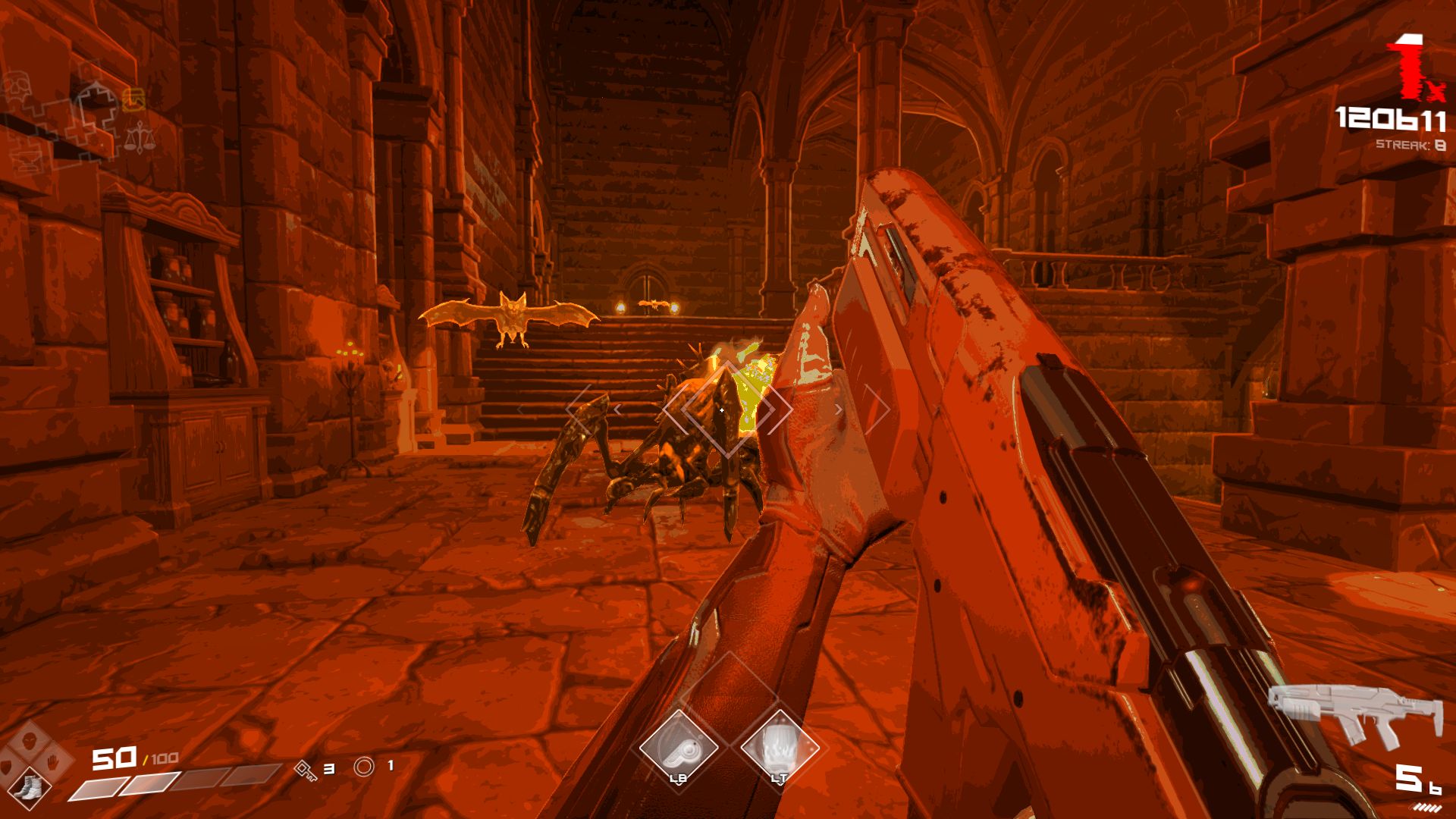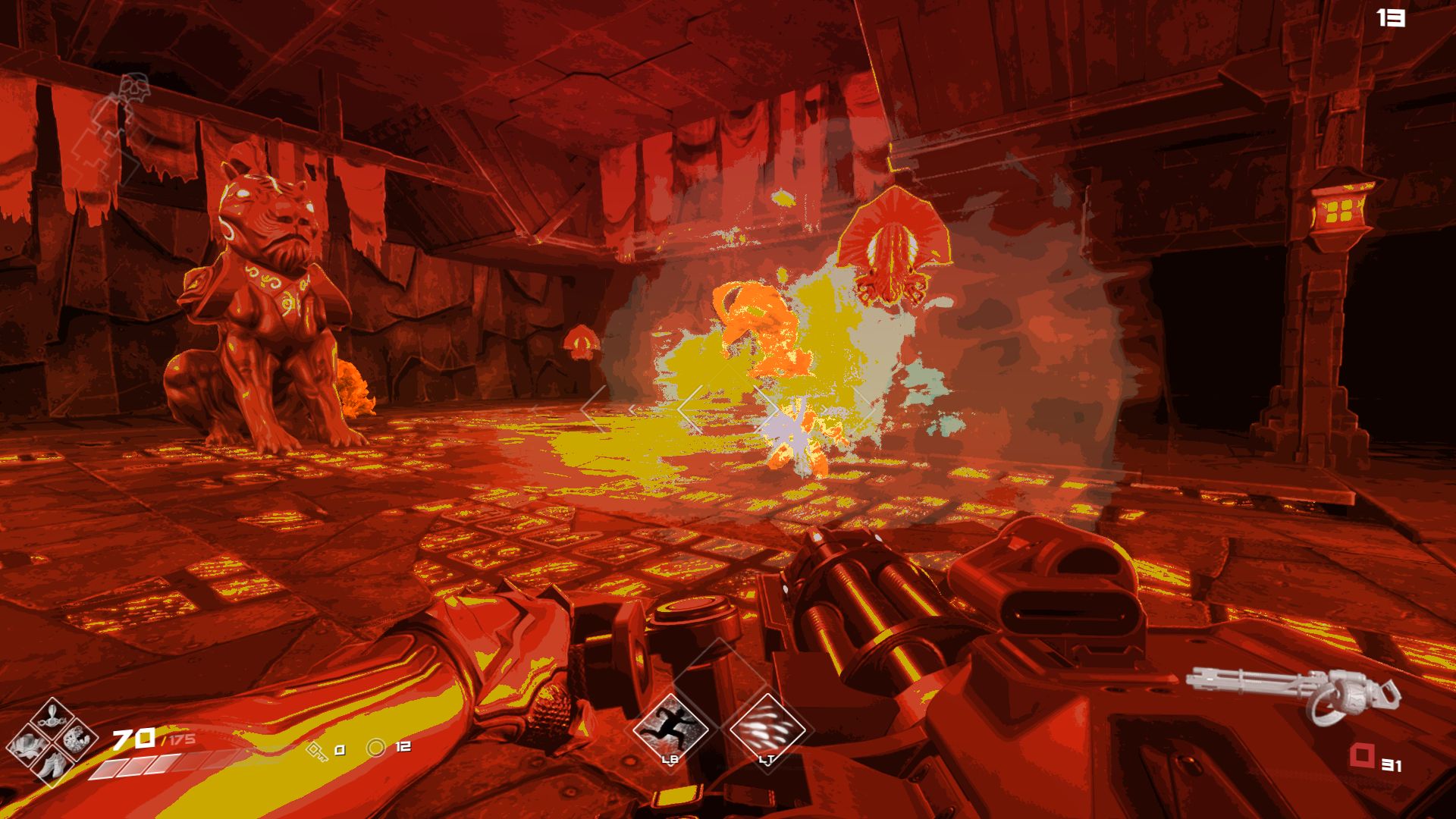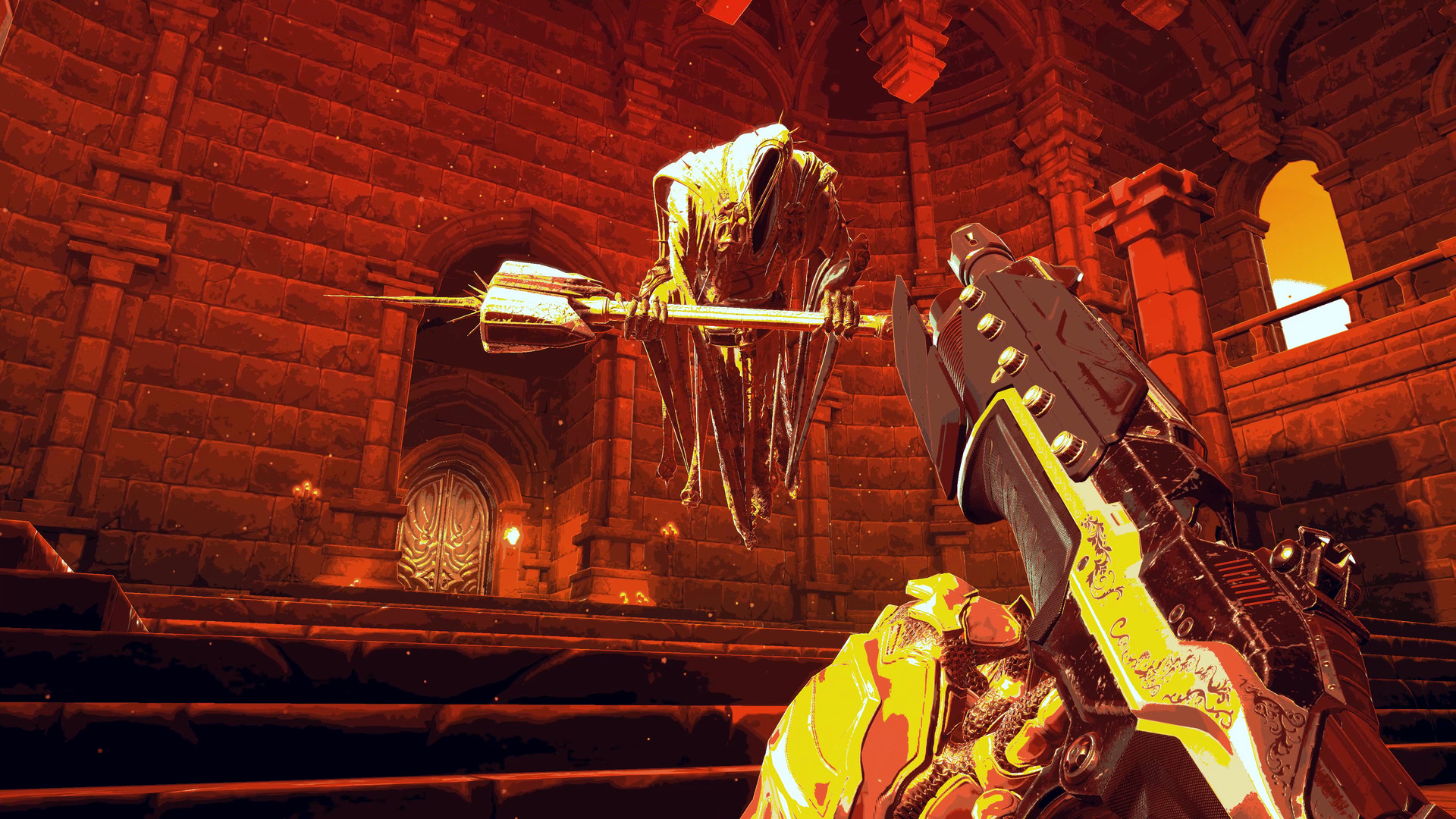What is it? A game that wants a roguelike, a rhythm game, and an FPS to have an electronic baby.
Expect to pay $20/£15
Developer Awe Interactive
Publisher Awe Interactive
Reviewed on GeForce GTX 1650, AMD Ryzen 5 3550H, 8 GB RAM
Multiplayer? No
Link Official site
I don’t know how many times I’ve found myself frozen by indecision, unable to decide whether I quite specifically want to play an FPS, a roguelike, or a rhythm game. Okay, I do know how many times—none—but now, that’s one less thing in life for me to potentially worry about. Here, we have a game that forces these disparate genres into an unholy tryst, and the sweaty aftermath is as attractive as it is unnerving. Please, let me explain.
Before I say anything else, I have to confess that, for at least ten minutes after first starting the game up, I genuinely believed that I’d run into a technical issue. A bug, perhaps, or a compatibility issue with my graphics card. Colour saturation has been deliberately kicked up to terrifying levels; the first area gives the impression of somebody having smeared syrup over my monitor when I wasn’t looking. This can be reduced in the menu, but it’s not possible to achieve ‘normal’ graphics. I got used to it. Eventually.
The main hook is that the actions of your weapons, both firing and reloading, are tied into the synth-tinged rock soundtrack. You need to act in time to the beat of the music. Try to shoot out of sync, and your gun jams. Attempt to reload outside of the beat (something that can require multiple button taps), and nothing happens. It makes sense, then, that enemy attacks are also tethered to the music. It’s a constant dance on a knife edge between me and the monsters.

It’s a system that takes some getting used to, but once I feel that I’m on top of it, it offers up some uniquely satisfying moments. Against a background of rumbling power chords and squealing guitar solos, I shimmy funkily through the dungeon like a demon-hunting Bruno Mars. Dun-dun-dun-dun, the guitar murmurs. Pow-pow-pow-pow, roars my gun, as I take out two bats and a worm. I automatically start timing my taps of the dodge button to match the music, even though I don’t need to. It’s strangely intoxicating.
However, this blissful feeling of synchronicity never lasts more than 15 minutes or so into a run. Doom is a clear influence, something that becomes increasingly obvious the further I progress. Constant movement is essential (something BPM explicitly tells me), and the claustrophobic rooms will often be crammed full of enemies. The problem is that Doom has a rhythm all of its own. A constant, urgent rhythm that keeps you on edge until danger has passed. Forcing this into the middle of an entirely different rhythm dictated by music is disorienting. Discordant.
The result is that the player is required to dance to two different internal beats simultaneously, something that I imagine many people will struggle with. I do, certainly in later stages where Doom’s rhythm becomes louder and more important. Therefore—and I feel almost guilty for saying this—the game only truly shines when the heart of the rhythm mechanic is torn from the experience.
Just beat it
Turning on auto-rhythm unshackles my weapons from the soundtrack. Suddenly, it doesn’t matter that a minor enemy can knock 25% off my health in one hit (even on Easy). I can throw my playstyle wholeheartedly into the echoes of Doom. Not only am I doing better, I’m having more fun. I can better appreciate the variety in the weapons to be found. Boss fights become challenges I relish rather than chores I dread.

Game modifiers that BPM identifies as Challenges can be unlocked, although how, I have no idea (this is one of several things the game has no interest in explaining). One I accidentally gain access to is Full Auto, which truly brings the game to life for me. Difficulty defaults to Hard, but all weapons have automatic fire, and there’s no need to worry about the rhythm mechanic.
The player is required to dance to two different internal beats simultaneously, something that I imagine many people will struggle with.
The roguelike design is a much more powerful influence on the experience than the rhythm shooting, partly why it doesn’t work as well as I’d hope. Oddly perhaps, there are no permanent advantages to earn. No shortcuts, no new starting weapons, no increased health, no increased base stats. There are stats in BPM by the way. Elements such as range, damage, and movement speed can be increased by offering coins to the randomly placed statues scattered across each dungeon.
Coins, with which you can also purchase weapons and items from the two mildly terrifying shopkeepers, are a good example of how BPM struggles with the concept of ordered chaos so integral to the roguelike experience. The one thing you can transfer between runs is coins, via a too randomly generated bank. While each dungeon will feature both shopkeepers, the bank is much rarer. It’s almost never there on the rare occasions my pockets are bursting with gold, and usually not to be seen when I most need to withdraw, either.

Similarly, the distribution of weapons and abilities could do with a little more order. There are some fantastic things to buy and find—a minigun, infinite ammo, a poisonous trail to leave in my wake, teleportation—but the best stuff tends to be distributed on an all or nothing basis. Bosses have more dangerous variations that can be generated, too. Fighting two big bads at once with the base pistol isn’t ideal, let me tell you.
The dungeons themselves have variations that crop up now and then, and really, these should be lumped in with the Challenges. I don’t mind being surprised with a low gravity dungeon, but suddenly having enemies that take and deal extra damage thrust upon me feels unfair. That’s something I should choose to challenge myself with, not stumble into partway through a run.
For all its flaws, there’s much to love in BPM, even though most of it is detached from the central rhythm mechanic. There’s a lot of rock-infused fun to be had—but you’ll have to dig for it.
